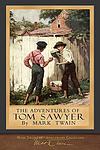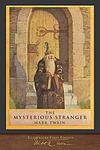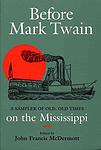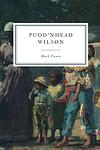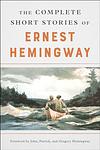Mark Twain
Mark Twain, whose real name was Samuel Langhorne Clemens, was an American writer, humorist, entrepreneur, publisher, and lecturer. Born on November 30, 1835, in Florida, Missouri, he is best known for his classic American novels 'The Adventures of Tom Sawyer' and 'Adventures of Huckleberry Finn.' Twain's writing is noted for its wit, satire, and keen observations of American society. He is considered one of the greatest authors in American literature and is often called the 'father of American literature.'
Books
This list of books are ONLY the books that have been ranked on the lists that are aggregated on this site. This is not a comprehensive list of all books by this author.
-
1. The Adventures of Huckleberry Finn
The novel follows the journey of a young boy named Huckleberry Finn and a runaway slave named Jim as they travel down the Mississippi River on a raft. Set in the American South before the Civil War, the story explores themes of friendship, freedom, and the hypocrisy of society. Through various adventures and encounters with a host of colorful characters, Huck grapples with his personal values, often clashing with the societal norms of the time.
-
2. The Adventures of Tom Sawyer
The book chronicles the mischievous adventures of a young boy living on the Mississippi River in the mid-19th century. The protagonist, a clever and imaginative boy, often finds himself in trouble for his pranks and daydreams. His escapades range from his romance with a young girl, his search for buried treasure, his attendance at his own funeral, and his witnessing of a murder. The narrative captures the essence of childhood and the societal rules of the time.
-
3. Life on the Mississippi
This book is a semi-autobiographical account of the author's experiences as a steamboat pilot on the Mississippi River before the American Civil War. It provides a detailed and humorous depiction of life and society along the river, including the author's own journey from an eager young apprentice to a seasoned riverboat pilot. The book also includes a travelogue of a journey down the Mississippi River much later in life, offering a look at the dramatic changes brought about by industrialization and the Civil War.
-
4. The Prince and the Pauper: A Tale for Young People of All Ages
This classic novel tells the story of two young boys in 16th century England who are identical in appearance: a pauper named Tom Canty and Prince Edward, son of King Henry VIII. Through a series of events, they end up switching places, with the prince experiencing the harsh realities of life on the streets and the pauper living in the luxury of the royal court. The tale is a social commentary on the inequality and injustices of the era, while also exploring themes of identity, compassion, and the inherent worth of individuals regardless of their social status.
-
5. A Connecticut Yankee In King Arthur's Court
The novel follows the fantastical journey of a 19th-century American engineer who, after a blow to the head, finds himself transported back in time to the medieval kingdom of King Arthur. Using his modern knowledge and ingenuity, the protagonist attempts to modernize the past society, introducing industrial technology and democratic ideas. His efforts to revolutionize the Arthurian world are met with both humor and a critical examination of the social and political issues of both the past and his contemporary society, ultimately leading to a complex interplay between progress and tradition.
-
6. The Mysterious Stranger
The novel is a dark and philosophical exploration of the human condition, set in a remote Austrian village during the Middle Ages. It follows the story of a group of young friends who encounter a mysterious and supernatural boy named Satan, who claims to be an angel and demonstrates his otherworldly powers through a series of thought-provoking and often unsettling miracles. As the narrative unfolds, the boy challenges the villagers' beliefs and perceptions of morality, good and evil, and the nature of existence, leading to a profound and controversial climax that questions the very fabric of reality and the role of a seemingly indifferent universe.
-
7. Roughing It
This book is a semi-autobiographical travelogue that chronicles the author's journey across the American West to Nevada. It covers his experiences as a miner, newspaper reporter, and lecturer, and includes humorous and insightful observations about the people, places, and culture he encounters. The narrative also provides vivid descriptions of the natural landscape, as well as commentary on the social and political issues of the time.
-
8. The Autobiography of Mark Twain
This book is an intimate and detailed account of the life of one of America's most celebrated authors. It covers his childhood in Missouri, his travels across the United States and Europe, and his career as a writer and public speaker. The book offers a candid and often humorous look at his personal life, his family, and his views on politics, religion, and literature. It provides an insightful look into his creative process and the experiences that influenced his most famous works.
-
9. Old Times On The Mississippi
This work is a captivating memoir that offers a vivid portrayal of life on the Mississippi River during the latter half of the 19th century. Through a series of engaging anecdotes and reflections, the narrative delves into the author's experiences as a young steamboat pilot navigating the complex and ever-changing waters of the Mississippi. The text not only provides a detailed look at the challenges and intricacies of steamboat piloting but also paints a rich picture of the diverse cultures, communities, and characters that inhabited the riverbanks. With its blend of humor, insight, and historical detail, this memoir stands as a testament to a bygone era, offering readers a glimpse into the adventures and realities of river life in America's past.
-
10. Pudd'nhead Wilson
This novel is a satirical exploration of identity, race, and societal perceptions in the antebellum South. It revolves around the consequences of a fateful decision made by a slave woman to switch her light-skinned infant son with her master's baby, aiming to spare her child from a life of slavery. The story unfolds in a small Missouri town, where the true identities of the two boys remain a secret for years, leading to a series of dramatic and ironic events. The narrative is enriched by the presence of a clever lawyer, known mockingly as Pudd'nhead for his perceived foolishness, who ultimately plays a pivotal role in unraveling the truth through his pioneering use of fingerprinting. The book critiques the absurdity of racial divisions and challenges the constructs of identity and social status, all while weaving a tale of mystery, humor, and tragedy.
-
11. Mark Twain's (Burlesque) Autobiography And First Romance
This book presents a humorous and satirical take on the autobiography genre, showcasing the author's early life and experiences in a light-hearted manner. It combines elements of burlesque with a fictional first romance, offering readers a glimpse into the author's imaginative and comedic talents. Through exaggerated tales and whimsical storytelling, the work playfully critiques the conventions of autobiographical writing, while providing entertaining insights into the author's perspective on his own life and the world around him. This blend of satire and fiction reflects the author's unique ability to engage and amuse his audience, making it a distinctive piece in his body of work.
-
12. The Devil's Racetrack
"The Devil's Racetrack" is a vivid account of human folly and the perils of temptation, set against the backdrop of a Mississippi river town. The narrative revolves around a horse race that becomes a metaphor for the darker aspects of human nature, as greed, deceit, and the lust for power take center stage. The characters, drawn with the author's characteristic wit and insight, become embroiled in a series of schemes and counter-schemes, all seeking to gain advantage in the race. Through this engaging tale, the story explores themes of morality, the consequences of vice, and the often-blurred line between right and wrong, all while maintaining a sharp, satirical edge that critiques societal norms and human weaknesses.
-
13. Complete Short Stories
This collection brings together the masterful tales of one of America's most influential writers, offering a showcase of his wide-ranging humor and keen observation of human nature. The stories traverse a variety of genres and settings, from the deep South to the Western frontier, blending satire, social commentary, and whimsy. The author's distinctive voice and unforgettable characters, including the mischievous boys of a small-town America and the cunning tricksters navigating society's foibles, reflect the complexities of the human condition with wit, irony, and insight. Through these narratives, the book captures the essence of 19th-century American life, revealing the joys, sorrows, and peculiarities of the time.

